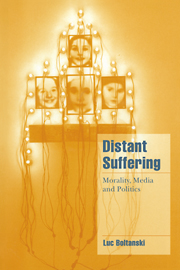5 - The topic of sentiment
Published online by Cambridge University Press: 22 September 2009
Summary
The unfortunate's gratitude
We come now to the second possibility for the spectator of distant suffering when he no longer goes down the road of indignation, denunciation and accusation in his sympathy with the resentment felt by an unfortunate towards a persecutor, but takes the other route set out by Adam Smith and sympathises with the unfortunate's gratitude inspired by the intervention of a benefactor.
Like the persecutor, the benefactor does not need to be present in person in the picture in order to lend his weight to the orientation of commitment. In the case of indignation we saw that it is precisely the processes of denunciation by which indignation, as emotion, is orientated towards an action, which make necessary the search for a persecutor whose true nature (individual or system) may be uncertain and subject to debate and dispute. The moment pity takes the definite form of indignation therefore is the most important moment of bifurcation setting off the sequence which leads to the identification and accusation of a persecutor. Likewise, the moment pity takes the definite form of tender-heartedness the route is marked out which turns away from the search for a persecutor, and so from accusation, and directs attention to the possibility of an act of charity performed by a benefactor.
- Type
- Chapter
- Information
- Distant SufferingMorality, Media and Politics, pp. 77 - 95Publisher: Cambridge University PressPrint publication year: 1999

